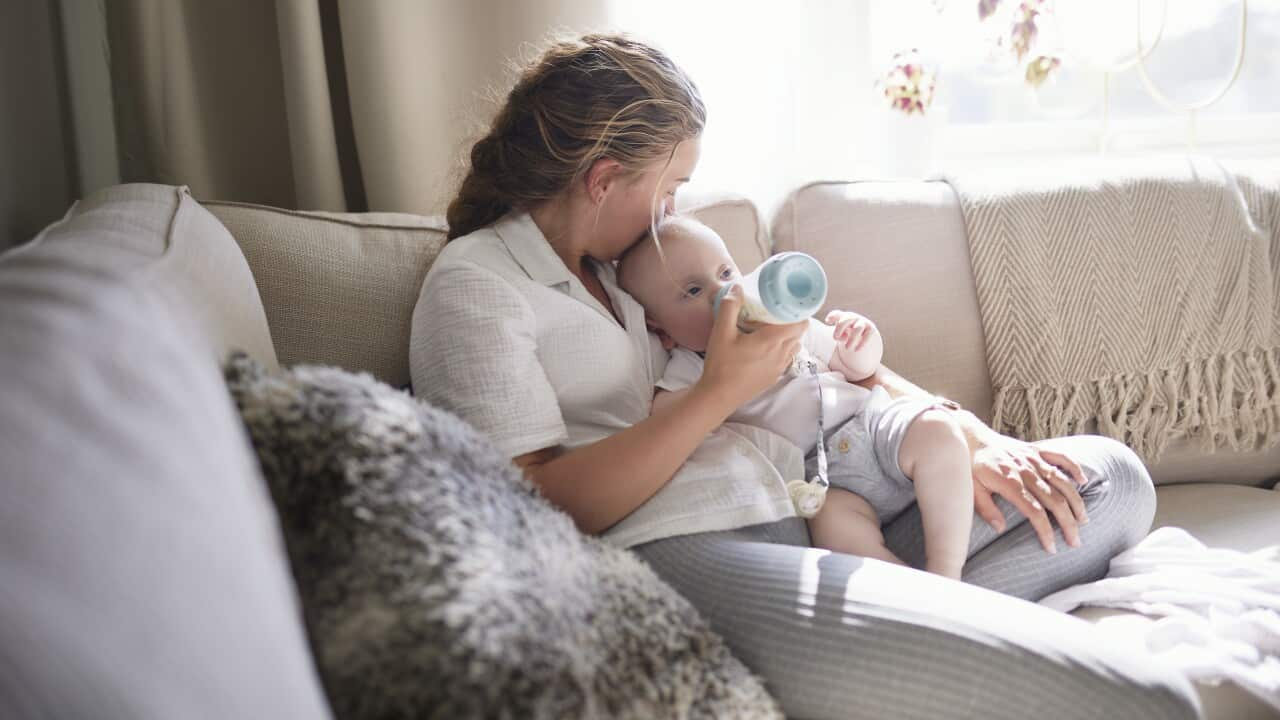Key Points
- The ATO has a measure in place that allows people to top up their partner's superannuation balance from their own.
- Financial educator Melissa Browne says the parent who stays at home to care for a child often loses out financially.
- Changes will allow superannuation to be paid on government-paid parental leave in the future.
What's theirs is mine, right?
That is how many Australian couples with children think about superannuation.
If that is the case, why then, on paper, does that money more often than not, remain in the man's name?
Financial educator Mel Browne is urging couples with children, or who are planning to have children to talk to one another about doing something known as super splitting.

A woman's reduced income after having a baby is part of what is called "the motherhood penalty" and extends to superannuation. Source: Getty / Igor Alecsander
What it's worth and the myth about super and divorce
According to Browne's calculations, a woman who takes a seven-year break from working to raise a child or children would lose almost $700,000 from their .
"It's not just the super during that time, it's the compounding nature of that super where it's not there working for you," she said.
The federal government is making changes so that from mid-2025, , which is paid at the rate of minimum wage and for 22 weeks.
However, many women are away from work for longer and return at a reduced capacity.
"The arrival of children has a large and persistent impact on the gender earnings gap, reducing female earnings by 55 per cent, on average, in the 5 years following parenthood," a Treasury working paper on the topic from 2023 noted.
It described the reduced income as part of what it called "the motherhood penalty".
Browne, who shares financial insights on her social media accounts, said she often receives comments from mothers who say a lower super balance is nothing to worry about as it will be shared and they would receive half their husband or partner's superannuation if they were to split up.
"There's no legislation that says if you're at home for a period of time caring for children, that you're entitled to half of your partner's super; that's not the case, it's just this myth that we think, of course, I'd get half, but not necessarily," she said.
Many of the comments on Browne's posts are from and express disappointment that they had not made arrangements to share their partner's super contributions when they stepped back from working to care for their children.
Splitting your spouse's superannuation contributions
The Australian Taxation Office (ATO) has a measure in place that allows people to top up their partner's superannuation balance from their own.
"When you split your contributions, you transfer or roll over a portion of the contributions you recently made to your super account to your spouse's super account," an ATO spokesperson told SBS News.

Changes will see super paid on government-paid parental leave in the future, but that leave is paid for less than six months, while a woman's income is often impacted for years after having a child. Source: Getty / Westend61
The ATO allows for up to 85 per cent of superannuation accrued in the previous financial year to be transferred to the super account of a person's spouse.
The application must be made with the person's super fund in the financial year immediately after the contributions were made.
Couples do not need to be legally married to apply to split super contributions but must have lived together "on a genuine domestic basis in a relationship as a couple".
As applications are made to super funds and not the ATO, the ATO was unable to say how often Australians make use of the ability to split superannuation payments.

A person can transfer up to 85 per cent of superannuation received in the previous financial year to their partner's super account. Source: Getty / Simonkr
Calculating the split
Browne has created her own Super Catch-up Calculator for women to estimate how much superannuation they miss out on while out of the workforce raising children but said couples could calculate how to more fairly split superannuation in a number of ways.
"You might look at your partner's super that they're earning and say, either we're going to split that 50/50 or we're going to work out the percentage that my wage is to yours, just say it was 40 per cent, let's make sure that we are sending 40 per cent of the super that you're earning to me," she said.
Browne said those with the cash flow to do so may decide to make additional payments to the so both people in the relationship continue to accrue superannuation at the rate they were before having children.
With many women returning to work part-time rather than full-time once they have children, Browne said splits could be adjusted to reflect this.
She said women should not feel bad about having these conversations because one partner's ability to earn a higher wage and therefore, superannuation is usually only possible because of the joint decision made for one parent to be at home with their children for a period.
Child care responsibilities
Browne admitted she knew of few women who had done super splitting with their partners from the time they first took maternity leave, but said more and more women and men were realising it is an option and working to retrospectively top up one partner's super.
"You might look at it and go, rather than 50/50 for the next three years, let's split 85 per cent for the next few years and really make that up and start to transfer some of your super balance across," she said.
According to the national strategy to achieve gender equality, in December 2021, 54 per cent of families reported the main person looking after children was a woman, and 40 per cent of families reported equal sharing of responsibility.
Only 4 per cent of families reported a man usually or always looked after the children.
Browne said the idea that a woman would be the one to take time off work was often "an automatic assumption that is still really baked into our DNA".
She said that assumption, combined with the idea "that, well, it doesn't really matter because I get it if we split anyway," is "undoing so many women financially".
Browne said couples had not talked about money well in the past because it could be uncomfortable.
"There was just an assumption of, we'll do this, and there's going to be a penalty, and that's just life, but that's not just life, we can do something about it."












